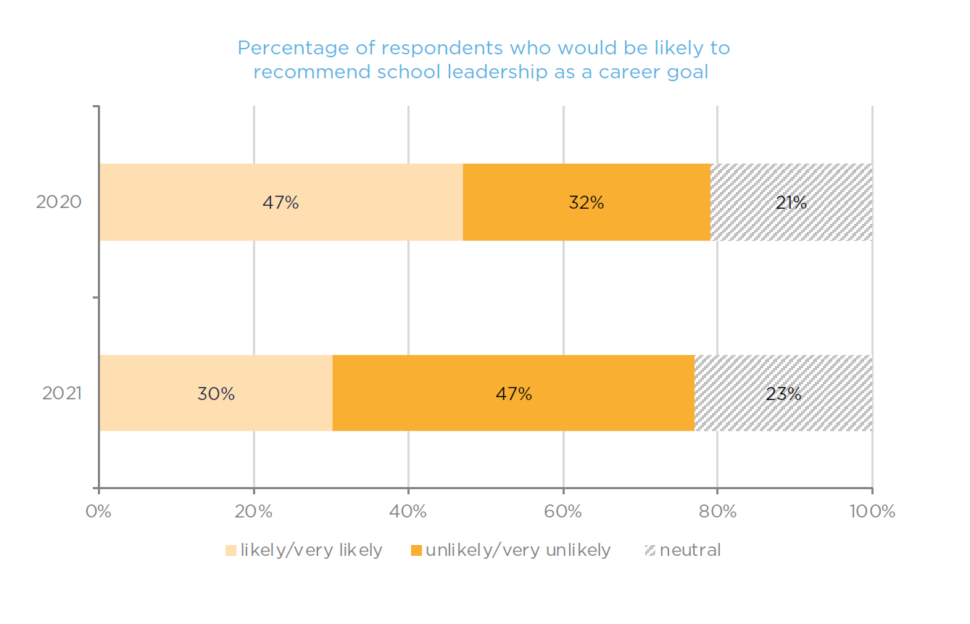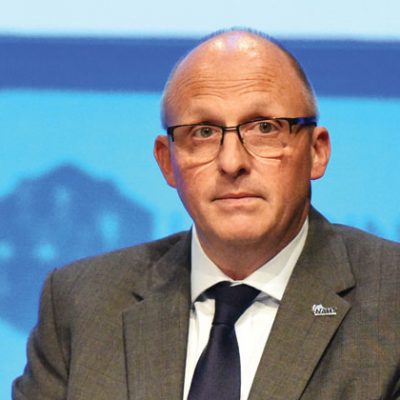Aspiration to headship has “plummeted” in recent years and serving heads are less likely to encourage others to follow in their footsteps, prompting fears leadership supply is “teetering on the brink of collapse”.
A survey of members of the NAHT school leaders’ union found the proportion of deputy and assistant heads and middle leaders who do not aspire to headship has risen from 40 per cent five years ago to 53 per cent today, a rise of 32.5 per cent
Recent research by Teacher Tapp found a similar trend among teachers, with the proportion who said they wanted to become a headteacher falling between 2018 and the present day. This aspiration dropped for both men and women, though women are less likely to aspire to headship.
The NAHT also found proportion of heads who said they would recommend school leadership as a career goal for others fell from 47 per cent in 2020 to 30 per cent in 2021, a fall of 36 per cent in just one year.
The figures have prompted warnings over leadership supply after almost two years of the pandemic, with the survey showing 93 per cent of leaders felt the government’s support for their wellbeing was ineffective.

Seventy-four per cent of respondents said keeping pace with government guidance had had the greatest impact on their workload over the last 12 months.
Fifty-seven per cent cited protecting the health and safety of staff and pupils as a leading source of workload.
Covid response ‘deepened’ leadership crisis
Paul Whiteman, the NAHT’s general secretary, said school leadership supply was “teetering on the brink of collapse”.

“Fewer teachers aspire to become school leaders, and aspiration to headship has plummeted.”
He said the government’s “confused and chaotic handling of the Covid response in schools has further deepened the existing crisis in school leadership”.
However, Covid wasn’t the only contributor to leaders’ disillusionment, with the report warning the pandemic “exacerbated already unrelenting workload pressures on school leaders”.
Pay was also a factor. Eighty-three per cent of leaders surveyed said this year’s pay freeze had negatively impacted their morale.
Asked what would improve the attractiveness of school leadership, 86 per cent of respondents said greater recognition of school leaders as professionals, while 70 per cent said a reduction in workload.
Heads struggle to access support
The survey results also suggest large numbers of heads want support with their wellbeing or mental health, but either don’t know how or found it is not available.
The government launched an £800,000 wellbeing service for school leaders. However, as revealed by Schools Week, this is only going to offer support to around one in ten headteachers.
In contrast, NAHT’s survey found that 38 per cent of assistant and deputy heads and 35 per cent of middle leaders said they needed support, but only 26 and 23 per cent respectively said they had accessed it.
‘Empower’ school leaders to restore trust
The report recommended that the government “restore trust” by “empowering school leaders to make the decisions that best meet their learners’ needs, free from centralised diktat and control”.
Ministers should also reform inspection and accountability measures to remove “drivers of unnecessary workload, fear and stress”, and restore leaders’ pay in real-terms.
A Department for Education spokesperson said the government was “incredibly grateful for the efforts of teachers and school leaders over the course of the past 18 months, supporting their pupils through the challenges of the pandemic”.
“We have taken a wide range of action to support leaders and ensure teacher development remains attractive and fulfilling. This includes launching a new mental health support scheme for school leaders, investing £250 million in training opportunities across all stages of teachers’ careers, and committing to reducing unnecessary workload.”















Your thoughts